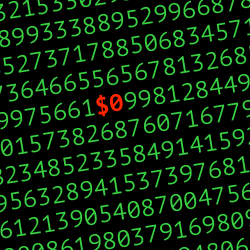A few days ago, I caught myself thinking about whether to save some images and video; whether the likely future value of those megabytes would be greater or lesser than the cost of storage. This is a sort of thought that was important and valuable… a couple of decades ago.
Bits are Free
Today, and at least for the last decade, bits are so absurdly cheap that they can be considered free, compared to the time and energy of people. Storing gigabytes or terabytes because they might come in handy is not just for government agencies, it makes sense for all of us in our daily work.
Waste bits to save time.
Waste bits to help people.
People matter, bits are free.
Bits are Free at Work
Here are some ways I waste bits at work:
- We often gather a few people working on project to meet or code together; it is very easy to start a video or screen video recording of the work. That recording can then be shared with anyone on the project who wasn’t present.
- We record screenshots or videos of the future in progress, and send it to a customer. Yes, we could wait and present to them “live” using WebEx or whatever. But it is cheaper to waste the bits and conserve human coordination effort.
- If I have something complex to explain to someone, I can do it in person, and I can do it on the phone, and I can write lots of text. But if I already know them well enough to partly anticipate their questions, I will start a video recording and explain something using voice and white board. The bits are cheaper than the coordination to work “live”. The bits are cheaper than asking them to figure it out themselves.
- Driving down the road, it is unsafe to text, or read, or write, or (I am looking at you, morning commuters…) apply makeup. But while the numbers are unclear, we have a broad assumption that merely talking with someone while driving down the road is OK. I sometimes make use of traffic time, and burn some bits, by recording audio about some problem to be solved or other matter. The bits are free, who cares if this uses 1000x as much data as sending an email?
Wasting bits can grow somewhat extreme. In the first example above, I described a screen video of developers working together, recorded for the benefit from other developers. You might imagine this as a high-ceremony process, done on important occasions about important code. But bits are free – so we sometimes record such video even if no developer will ever pay attention to it – the value is there even if just one developer maybe lets it play in the background while they work on something else – much like by working in the same room as other people, it is common to pick up some important bit in the background. If one developer learns one small thing to make their work better, that is more valuable than 400 MB of video storage space.
 Bits are Free at Home
Bits are Free at Home
Here are some ways I waste bits at home:
- When I take photographs, I take a lot of photographs. One might come in handy. Who cares if 95% of them are bad and 90% of them are useless?
- Why do cameras have settings other than maximum resolution? Bits are free.
- Nearly 100% of paperwork I get in the mail, other than marketing, I scan, OCR, and keep in a searchable archive. The disk space for this costs almost nothing. The time saved deciding whether to keep each item, and how to file each item, is irreplaceable. I probably only ever look at 10% of what is scanned, but who cares?
- If my kids are doing something even vaguely interesting, I try hard to remember to take photos and record video. Looking back at when they were very young, snippets of video we have (from before every phone had a decent video camera) are priceless. I can’t reach back and record more of those, but I can easily record things now that might be fun in the future. Who cares if 95% of that video no-one ever looks at? If I ever need to go through it, I can do it then. The storage space in the meantime doesn’t matter.
- If I need to look at a model number, serial number, etc. of anything around the house, I snap a photo of it. Then I can look back at the photo anytime from anywhere. Yes, it is absurd to store 3,000,000,000 bytes of JPG rather than 20 bytes of serial number. But they both round to zero.
How Free Can Bits Get?
I expect this tradeoff will shift even more exponentially in the future. In a couple of decades, perhaps:
- We will record 5 petabyte ultra beyond-HD holographic recordings of insignificant activities just in case someone wants to watch them.
- We will run video and audio recording of our lives 24 x 7, to be indexed just in case anyone ever wants to look back at it.
- Future cameras won’t even come with an on-off switch, and will instead record continuously for the lifetime of the camera.

